Best Ways to Make a Difference for Bears
How about taking a paws to help bears?
In nature, bears are curious and energetic, roaming vast territories, where they can play and forage. Black bears naturally stay with and learn from their affectionate and devoted mothers for up to two years, and cubs rarely survive hibernation without them.
But did you know that at roadside zoos around the world, workers often separate mother bears from their cubs only weeks after birth? Are you aware that hunters who kill bears for their fur often lure them with bagels and cookies, then shoot them with crossbows? If the wounded bears don’t die right away, they flee and suffer for hours, days, or even longer before dying of blood loss or infection.
You can help bears today. Get started now:
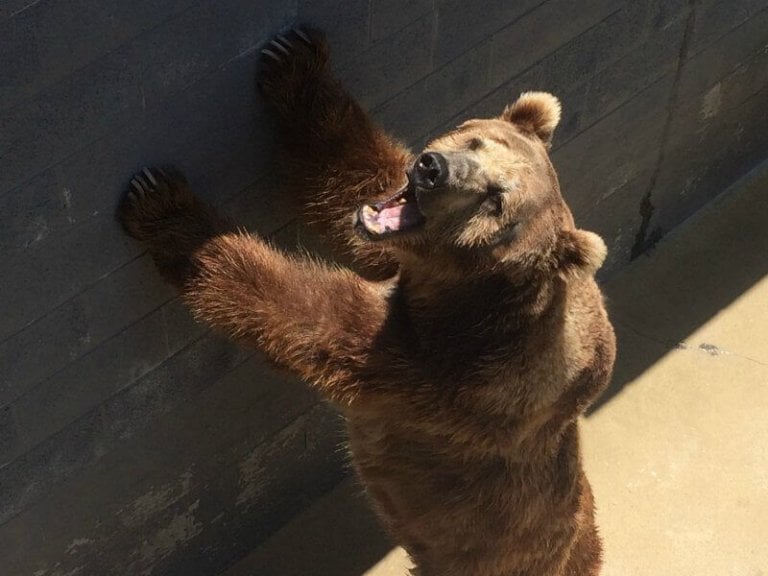
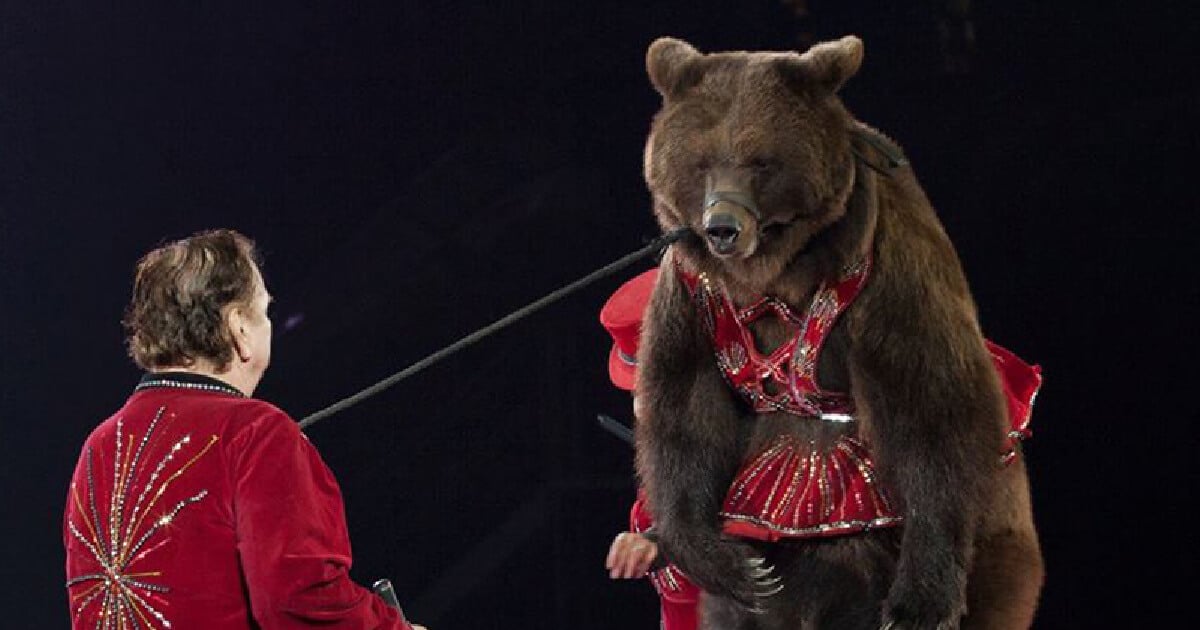
Help Bears Who Are Suffering at Tourist Traps
Across the U.S., hundreds of bears endure miserable lives in wretched roadside zoos, where many of them are confined to small concrete-floored enclosures or dismal pits. Some cubs’ daily torment includes being forced to participate in photo ops with tourists—like the cubs at Oswald’s Bear Ranch in Michigan, who are kept in desolate pens, crying, pacing, and chewing on their cages due to emotional distress. Workers don’t allow them to engage in anything that’s natural or important to them, such as foraging, playing with their siblings, or roaming vast, dense forests.
Because bears have evolved to live in varied and complex natural environments, they can’t cope with small concrete enclosures at roadside zoos. Two North American black bears at Three Bears General Store in Pigeon Forge, Tennessee are confined to a concrete pit and have virtually nothing to do except stare at the walls and beg tourists for food. These bears don’t deserve to spend their lives on concrete, when they should be foraging through dirt and climbing trees.
At Cherokee Bear Zoo in Cherokee, North Carolina, cubs are stolen from their mothers and used for photo opportunities. They are forced to undergo unwanted touching by humans every day until they have grown too big, and then they are shipped off to other roadside zoos or thrown into tiny concrete pits for the rest of their lives.
Two North American black bears, Sierra and Ursula, have spent years living in a cramped concrete pit at Spring River Zoo in Roswell, New Mexico. These sisters should be walking on soft ground and digging dens. Yet, they are forced to spend their lives stuck in a concrete pit that causes a number of physical and psychological issues.
The bears exploited at these roadside zoos are expected to entertain tourists year-round. Some aren’t even allowed to hibernate, which is a serious disruption of their natural behavior that causes severe psychological stress.
Many exploited bears are denied adequate veterinary care, including to treat illnesses that often develop as a result of premature maternal separation and stress from being handled by the public. Yellowstone Bear World and Bear Country U.S.A. have a history of confining animals to cramped enclosures that lack adequate space and failing to provide them with appropriate veterinary care.
Cruelty in Traveling Acts and Circuses
In traveling shows around the world, workers often force bears to endure grueling conditions and perform meaningless, demeaning tricks, such as riding a scooter, walking on their hind legs, or pulling hoops over their heads. Many trainers violently abuse them into submission, compelling them to perform these cruel stunts, even chaining cubs by the neck, forcing them to stand upright—which is unnatural and painful for them—for hours.
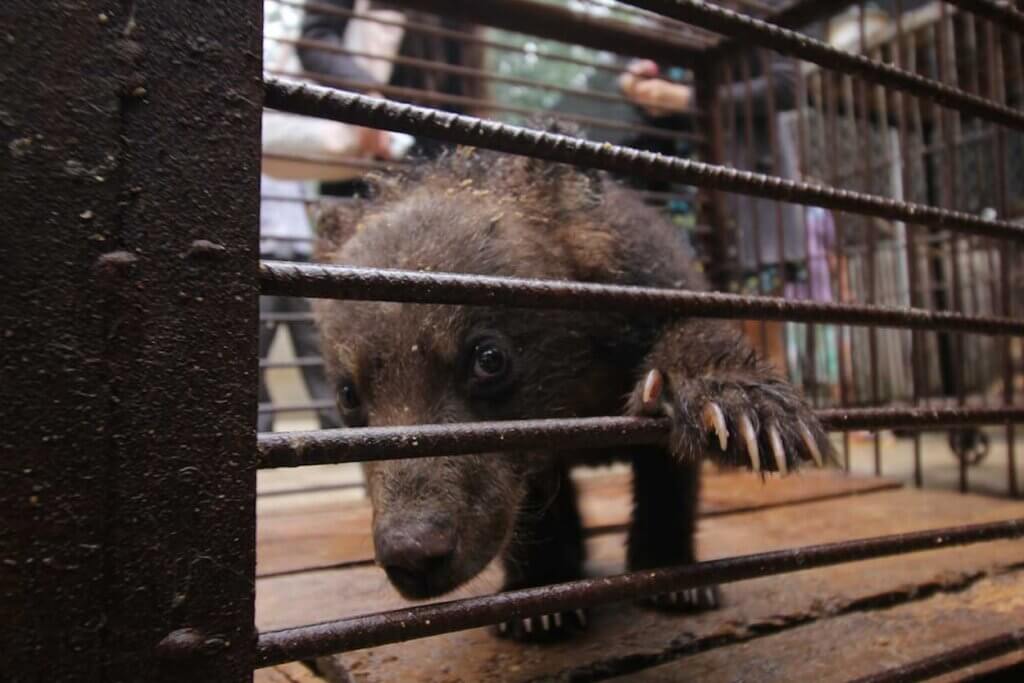
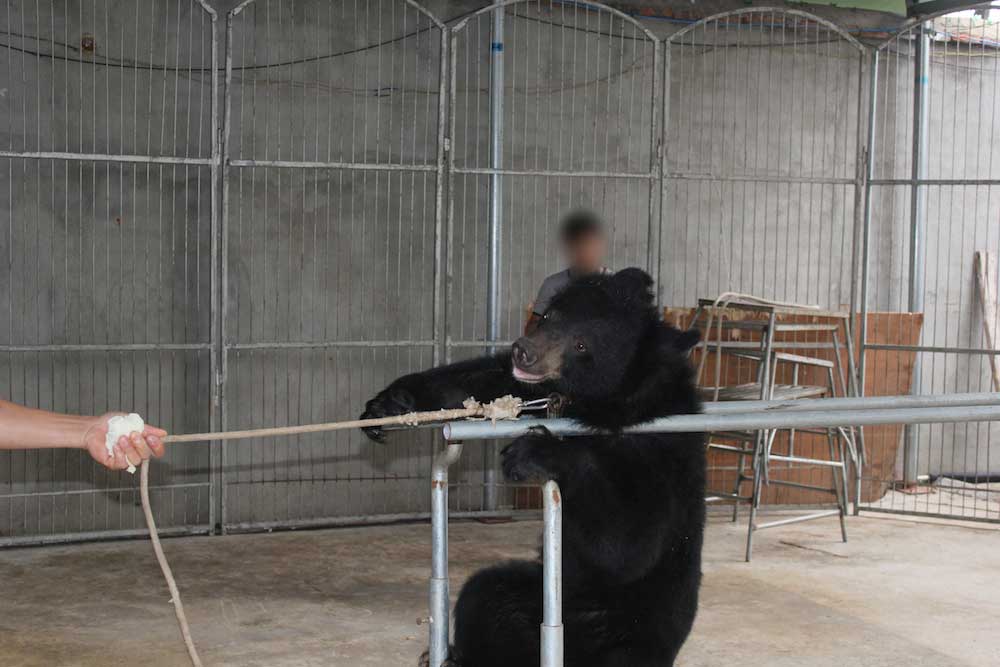
Bearadise Ranch used to cart bears across the country in cramped transport trailers, forcing them to perform meaningless tricks. Now it seems to operate as a stationary roadside zoo. Rosaire’s Bears has been cited for keeping bears in a rusty and dilapidated steel shipping container and feeding them mostly bread. During a Shrine circus performance by this operation in 2018, one bear was seen urinating twice and then licking his urine off the floor. According to an expert, this behavior was likely a severe distress response to being forced to perform uncomfortable acts. Bears suffer when they’re used as if they were just money-making machines.
In the Chinese circus industry, trainers hit, chain, and deprive bear cubs, stringing them up by the neck and forcing them to perform tricks through violence and intimidation. PETA Asia’s investigator documented that bear cubs are chained or tethered to a wall so that they remain upright, sometimes for hours, to force them to walk on their hind legs. If they can’t hold themselves up, they risk choking and hanging themselves.
Abusing bears in circuses isn’t unique to China. Every circus that features animals uses terrifying and cruel training methods and keeps them in cramped living conditions. U.S.-based circuses, such as Carden International Circus, Jordan World Circus, Loomis Bros. Circus, and many Shrine circuses, exploit big cats, elephants, and bison; hold private training sessions; and are not accountable to any regulatory agency.
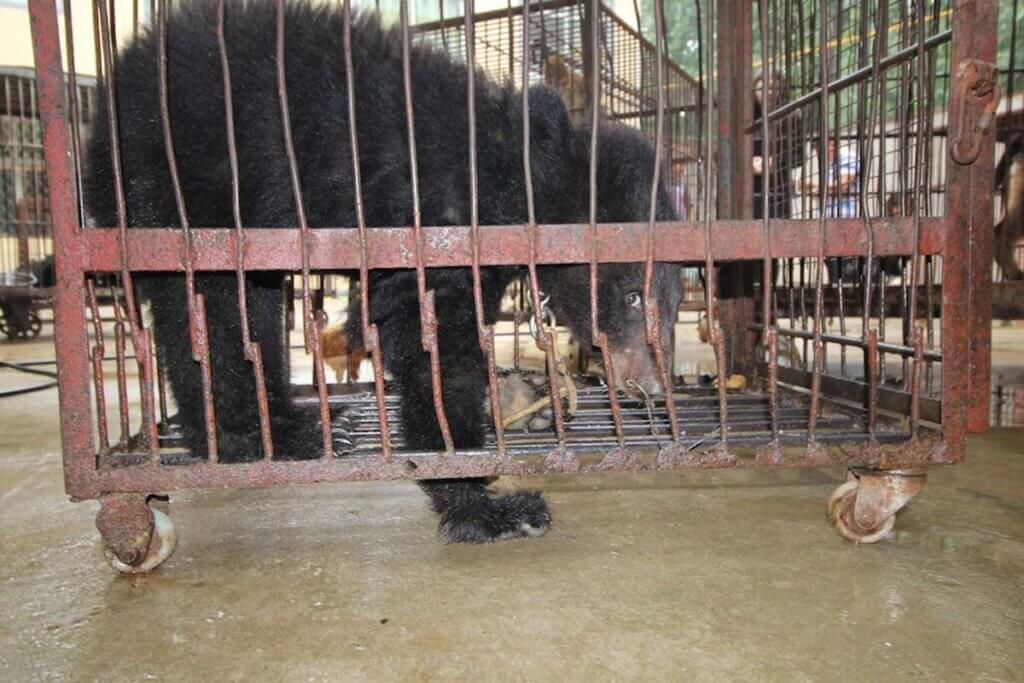
Never buy a ticket to a circus or any other event that uses animals. Instead, support acts that focus only on spectacular human talent. Refuse to attend circuses that use animals, and urge your family members and friends to do the same.

Bears Used in Film and TV
Bears are also used for entertainment by film and television companies. They are typically torn away from their mothers as babies and forced to endure abusive training and lives of traumatic exploitation. Trainers frequently use cruel techniques such as food deprivation, beatings, electric shocks, and chaining so that the bears will fear their trainers, breaking their spirits in order to make them compliant and compel them to perform on cue. When filming is over, they’re often forced to live in extreme confinement, where they may be muzzled and kept in cramped cages or tied up.
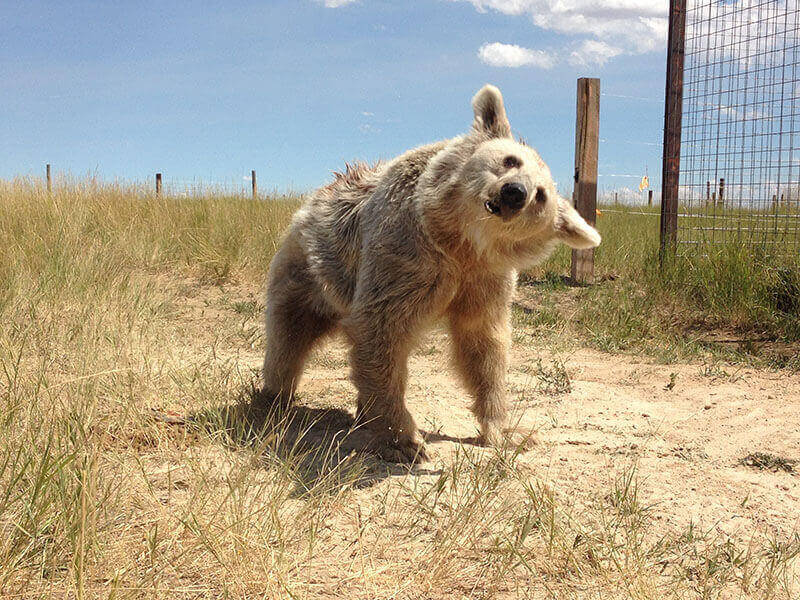
In nature, bears shy away from humans and noise, so a film or TV set is a particularly stressful environment for them, and trainers don’t want you to know that abuse and deprivation are standard practices in the industry. The FOX series Animal Control used a bear in its first season. Take action to help prevent the show’s producers from continuing to exploit animals.
Speak up for bears compelled to live in unnatural situations. Urge the facilities confining them to do the right thing by improving their conditions or sending the animals to reputable sanctuaries where they could receive the care they need.
Bears Killed for Clothing
A PETA investigation in Ontario, Canada, filmed hunters luring bears to a drum baited with cookies, bagels, and greasy foods before shooting and disemboweling them. They later skin the bears and may sell their fur—which is used to make the King’s Guard’s caps—which PETA has demanded be replaced with faux fur.
Please view the video below, narrated by renowned British actor Stephen Fry, and then take action to speak up against slaughtering bears.
Faux bear fur is available right now. PETA U.K. and luxury faux furrier ECOPEL have created the world’s first faux bear fur that’s virtually indistinguishable from the real thing, and laboratory tests confirm that it performs as well as or better than real bear fur, meeting the U.K. Ministry of Defence’s five criteria for a replacement fabric.
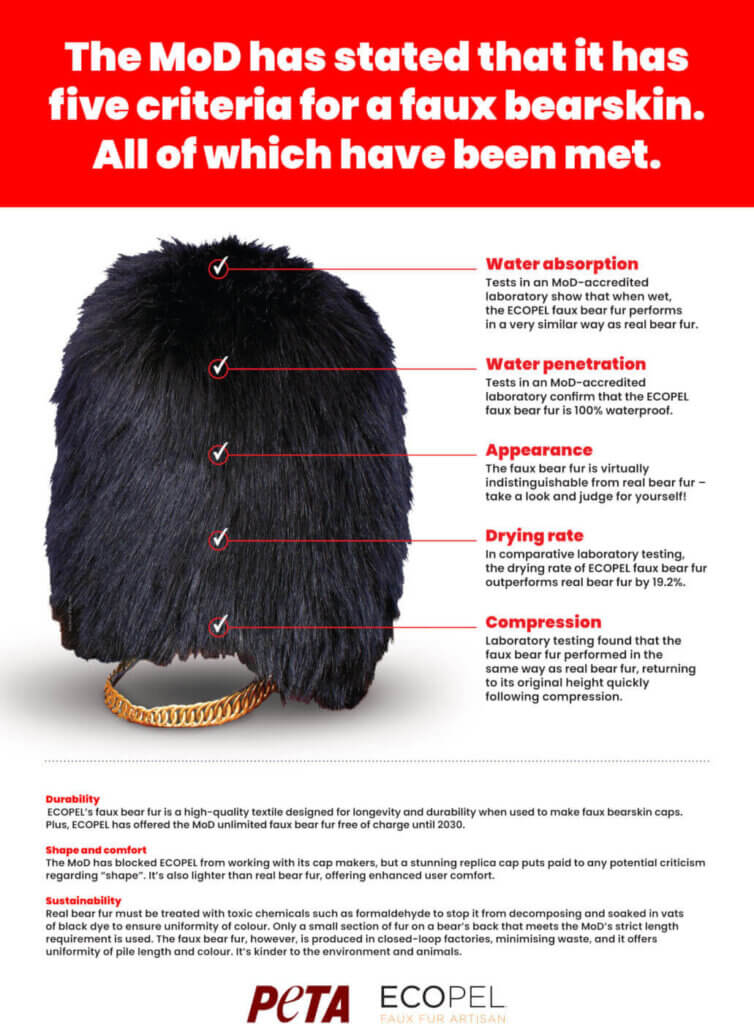
The ministry has no legitimate excuse left for not making the humane switch to faux fur. Read more about the campaign here, and use the links below to take action for bears.
What You Can Do
Instead of buying caps made of fur obtained through the shameful slaughter of black bears, the U.K. should set a compassionate example by switching to high-tech, luxurious faux fur. Please urge the U.S. ambassador to the U.K., Jane Hartley, to use her influence to help replace bearskin with faux fur for the King’s Guard’s caps:
- If you live in the U.K., please take action here.
- If you’re a Canadian resident, please take action here.
Take Action With PETA: Help Bears Now
Bears are complex individuals who climb, dig, forage for a plethora of foods, travel far, build nests, collect vegetation to make beds, and care for their babies. Black bears have exceptional navigational abilities, and brown bears have extraordinary digging capabilities due to the hump made entirely of muscle at the top of their shoulders. These remarkable animals need your help.

PETA makes it quick and easy to take multiple actions for bears. As soon as you take one action, another one will appear in its place. You can speak up through all of them!
After you enter your information, keep clicking “Send Message” to make your voice heard. Then share this page with your friends and family members so that they can add their voices and help these animals, too. Encourage them to join you in taking action to help bears.